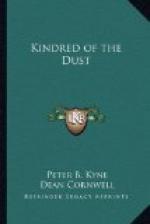She stared at him in frank amazement.
“Yes, I have been tremendously interested in learning the secret of their marvelous perspicacity.”
“I supplied Misther Daney wit’ your address, allanah.”
“How did you know it? Did The Laird—”
“He did not. I did it all be mesel’. Ah, ’tis the romantic divil I am, Miss Brint. Sure I got a notion ye were runnin’ away an’ says I to meself, says I: ’I don’t like this idjee at all, at all. These mysterious disappearances are always leadin’ to throuble.’ Sure, what if somebody should die an’ lave ye a fortun’? What good would it be to ye if nobody could find ye? An’ in back o’ that agin,” he assured her cunningly, “I realized what a popular laddy buck I’d be wit’ Misther Donald if I knew what he didn’t know but was wishful o’ knowin’?”
“But how did you procure my address in New York?” she demanded.
“Now, I’m a wise man, but if I towld ye that, ye’d be as wise as I am. An’ since ’twould break me heart to think anybody in Port Agnew could be as wise as mesel’, ye’ll have to excuse me from blatherin’ all I know.”
“Oh, but you must tell me, Dan. There are reasons why I should know, and you wouldn’t refuse to set my mind at ease, would you?”
Dirty Dan grinned and played his ace.
“If ye’ll sing ‘The Low-backed Car’ an’ ‘She Moved Through the Fair’ I’ll tell ye,” he promised. “Sure I listened to ye the night o’ the battle, an’ so close to death was I, sure I fought ’twas an angel from glory singing’. Troth, I did.”
She sat down, laughing, at the antiquated piano, and sang him the songs he loved; then, because she owed him a great debt she sang for him “Kathleen Mavourneen,” “Pretty Molly Brannigan,” “The Harp That Once Thro’ Tara’s Halls,” and “Killarney.” Dan stood just outside the kitchen door, not presuming to enter, and when the last song was finished, he had tears in his piggy little eyes; so he fled with the posies, nor tarried to thank her and wish her a pleasant good-night. Neither did he keep his promise by telling her how he came to know her New York address.
“Let me hear anny blackguard mintion that one’s name wit’ a lack o’ respect,” Mr. O’Leary breathed, as he crossed the vacant lots, “an’ I’ll break the back o’ him in two halves! Whirro-o-o! Sure I’d make a mummy out o’ him!”
XXXVI
A month passed, and to the Sawdust Pile one evening, instead of Dirty Dan, there came another messenger. It was Mr. Daney. To Nan’s invitation to enter and be seated, he gave ready acceptance; once seated, however, he showed indubitable evidence of uneasiness, and that he was the bearer of news of more than ordinary interest was apparent by the nervous manner in which he twirled his hat and scattered over her clean floor a quantity of sawdust which had accumulated under the rim during his peregrinations round the mill that day.




